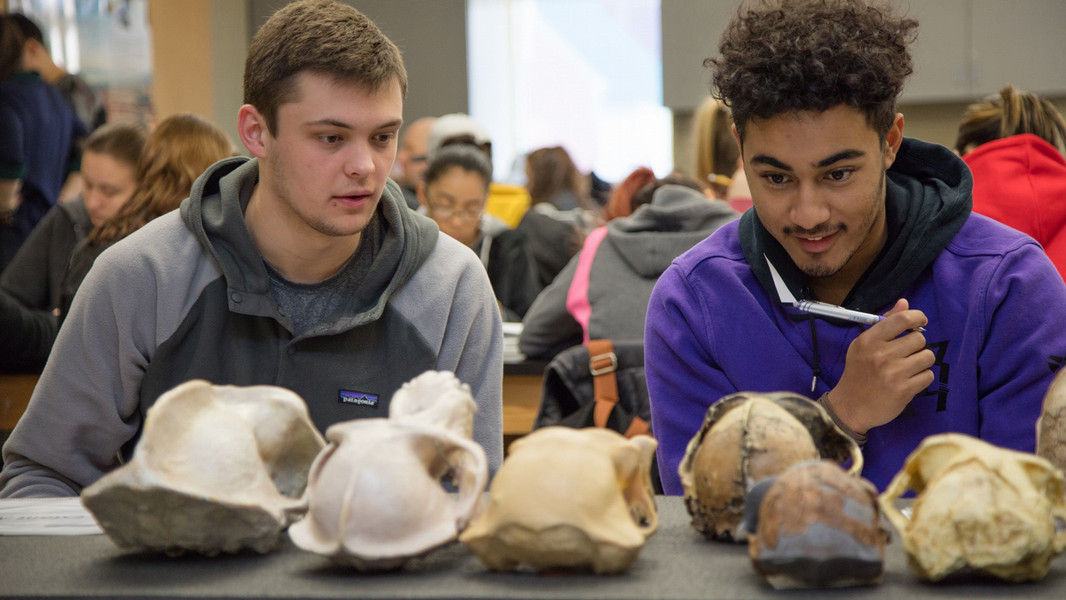
Primate
Program Requirements
In addition to the general regulations for admission to Masters programs at Central, applicants for admission to the Primate Behavior program must meet the following qualifications:
-
Students must submit a statement of purpose. Please follow the link to download a copy of the questions that should be addressed within this statement or email the PB Director for a copy (bindera@cwu.edu).
-
Students must hold an undergraduate degree in anthropology, psychology, or biology. Before admission, program faculty will evaluate the academic course work and experience of all applicants for admission and will recommend remedial course work if, in their judgment, there are deficiencies in pre-baccalaureate work which need to be overcome before entrance into the program. Admission to the program and continuation in it may be conditional on the applicant's satisfactory completion of remedial courses. Such courses will not count toward the program credit requirement, but in some cases they may be taken after admission to the program.
-
International students for whom English is a second language must provide TOEFL scores to demonstrate English proficiency.
-
Students must arrange for a graduate faculty advisor in the program to serve as their committee chair.
*Please note that GRE scores are no longer an admission requirement for the Primate Behavior Program.
Course of Study (48 credits)
Core Requirements (30 CREDITS)
PRIM 503 Current Issues in Primatology (4 credits)
PRIM 504 Primate Culture and Cognition (4 credits)
PRIM 505 Ethnoprimatology (4 credits)
PRIM 506 Survey of the Primates (4 credits)
PRIM 513 Research Methods in Primatology (5 credits)
PRIM 514 Research Design in Primatology (3 credits)
PRIM 700 Thesis (6 credits)
Additional Courses (18 CREDITS)
Electives should be selected in consultation with the student’s faculty advisor. Note that students can opt to select courses from among several foci.
Primate Behavior and Ecology courses:
-
- PRIM 511 Primate Conservation
- PRIM 512 Monkeys of the Neotropics
- PRIM 516 Apes
- PRIM 518 Monkeys of Asia and Africa
- PRIM 519 Lemurs and Lorises
Students can take classes in philosophy that have relevance for how nonhuman animals are treated, their status in terms of legal rights, and the history of how humans have viewed and classified nonhumans as, for example, property or as being fundamentally different from humans.
- PHIL 463 Philosophy of Mind
- PHIL 465 Advanced Ethics
- PHIL 480 Philosophy of Science
- PHIL 498 Special Topics
Students can take courses in biology and anthropology that address conservation issues from both the perspectives of indigenous peoples and what biology can teach us regarding the effective long term management of small populations:
- BIOL 453 Mammalogy
- BIOL 501 Research Methods and Techniques
- BIOL 565 Advanced Animal Behavior
- BIOL 566 Conservation Biology
- BIOL 570 Developments in Organismic Biology
- REM 540 Ecology and Culture
Students can focus on the close relationship between the disciplines of primatology and psychology:
- PSY 441 Self-Injurious Behavior
- PSY 460 Cognitive Psychology
- PSY 473 Psychology of Thought and Language
- PSY 484 Violence and Aggression
- PSY 542 Evolutionary Psychology
- PSY 552 Human Growth and Development Advanced
- PSY 555 Design and Analysis for Applied Research
- PSY 558 Advanced Statistics
- PSY 565 Advanced Animal Behavior
- PSY 576 Comparative Psychology
- PSY 578 Applied Physiological Psychology
- PSY 580 Current Issues in Psychology
Students can focus on developing management skills that can be applied to free-living and captive nonhuman primates or other species.
- PRIM 502 Senior Animal Technician
- REM 502 Policy and Law in Resource Management
- REM 515 GIS in Resource Management
- REM 562 Issues and Conflicts in Resource Management
At least 30 credits of course work must be graded (rather than Satisfactory/Unsatisfactory). Students must follow the deadlines detailed in the School of Graduate Studies and Research website.
-
In order to complete the MS degree, graduate students in the PB program are required to complete a thesis, project, or submit a journal article to a peer-reviewed journal.
-
No human or animal research of any kind may be conducted without obtaining prior approval from the relevant department and university review committees. In the case of research with human subjects, the review is conducted by the Human Subjects Review Board. Animal research is subject to regulation by the Institutional Animal Care and Use Committee.
-
Credit toward the graduate degree will not be accepted for courses in which a grade of lower than C is earned.
-
Grades for all courses included on the Course of Study must average at least a 3.0, where the cumulative grade point average is calculated on all courses taken after admittance into a graduate program, whether part of the approved Course of Study or not. A graduate student whose cumulative grade point average falls below 3.0 at the end of any quarter will be placed on academic probation for the next academic quarter. While on probation, a student may not hold a graduate assistantship. If the cumulative grade point average remains below 3.0 after a second consecutive quarter, the student will no longer eligible to continue in the Master's program.
CWU News

Online Master’s of Education program now offers special education endorsement
May 15, 2024
by Rune Torgersen

Lenny Price brings Detroit perspective to CWU Jazz
May 15, 2024
by University Relations